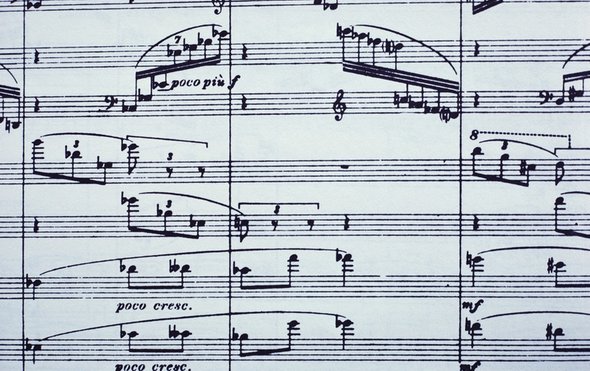(单词翻译:单击)
听力文本
This is Scientific American's 60-second Science, I'm Karen Hopkin.
This will just take a minute.
Music includes a lot of repetition. What would your favorite song be without a chorus? But the connection runs even deeper than that. Because the very act of repeating something can render that thing melodious—even the sound of a shovel being dragged across the pavement. That's according to a study to be published soon in the journal Music & Science.
A few years back, psychologists at the University of California, San Diego, discovered that when words or phrases are repeated a few times, they can start to sound more like singing than speaking.
("The sounds as they appear to you are not only different from those that are really present, but they sometimes behave so strangely as to seem quite impossible. But they sometimes behave so strangely. Sometimes behave so strangely. Sometimes behave so strangely. So strangely. So strangely. So strangely. So strangely." Credit: speech to song illusion/Deutsch)
The effect is perhaps not entirely surprising. Talking and singing are both forms of vocal communication. But researchers got to wondering: could repetition also musicalize other types of sounds?

So they collected clips of 20 different environmental sounds...including water dripping, ice cracking, whales calling, and the aforementioned shovel. And they played the snippets to 58 undergraduates...first, as single sounds (single whale call) and then in a series with increasing reiteration (whale call repeated).
What they found is that...as the repeats stacked up...the participants rated the sounds as being more tuneful.
The conclusion:
"Repetition's power to musicalize seems to extend to a broader variety of sounds than just speech."
Elizabeth Margulis, director of the music cognition lab at the University of Arkansas, who led the study.
"These perceptual transformations are powerful because nothing changes in the acoustic signal itself. That is held fixed. Everything that sounds different comes from the mind itself, making these illusions particularly useful for understanding the musical mode of listening. What are we doing when we're hearing something musically? How is this different from other kinds of hearing? These transformations allow us to tackle these kinds of questions head on."
(ice crack sound repeated)
Thanks for the minute for Scientific American — 60-Second Science. I'm Karen Hopkin.
参考译文
这里是科学美国人——60秒科学系列,我是凯伦·霍普金。
本期节目只需要一分钟时间。
音乐包含很多重复部分。你最喜欢的歌曲没了副歌会变成什么样子?但是,音乐与重复还有更深层的联系。因为这种重复会让声音变得有音乐性——即使是在人行道上拖动铁铲的声音。这一结论来自即将在《音乐与科学》期刊上发表的一项研究。
几年前,加州大学圣地亚哥分校的心理学家发现,单词或短语重复几次以后,它们就开始听起来更像是唱歌而不是说话了。
“你听到的声音不仅和那些存在的声音不同,而且有时候还表现得非常奇怪,以致于听起来相当不可思议。而且声音有时表现得非常奇怪。有时就是非常奇怪。非常奇怪。非常奇怪。非常奇怪。”(来源:语音变歌曲幻觉/多伊奇)
这种效果也许没什么奇怪的。因为说话和唱歌都是口头交流的形式。但是研究人员想知道:重复是否也能音乐化其他类型的声音?
所以,他们收集了20种不同环境中的声音片段,其中包括水滴落的声音、冰裂声、鲸鱼叫声以及前面提到的铲子声。然后,他们给58名大学生播放了这些声音片段,首先是单一的片段(单次鲸鱼叫声),然后播放一系列不断重复的声音(重复的鲸鱼叫声)。
他们发现,重复次数增加时,参与者认为这些声音变得更加悦耳。
结论是:
“重复在音乐化方面的力量似乎可以扩大到更广泛的声音范畴,而不仅仅是语言。”
阿肯色大学音乐认知实验室主任伊丽莎白·马古利斯负责这项研究。
“这些感知转换很强大,因为声音信号本身没有任何变化。那是恒定不变的。所有听起来不同的声音都来自于思维本身,这使这些错觉对于理解听觉的音乐模式尤为有用。我们在听到具有音乐性的声音时会有什么反应?这与听到其他类型的声音有什么不同?这些转换使我们能够正面解决此类问题。”
(重复的冰碎裂声)
谢谢大家收听科学美国人——60秒科学。我是凯伦·霍普金。
译文为可可英语翻译,未经授权请勿转载!
重点讲解
重点讲解:
1. according to 据…所说;按…所载;
例句:According to an article in The Economist the drug could have side effects.
《经济学家》杂志上的一篇文章讲到这种药可能有副作用。
2. be different from 有差别的;不同的;
例句:The worker of today is different from the worker of yesterday.
如今的工人和以往的不同了。
3. allow sb. to do sth. 允许;容许;准许;
例句:The compromise will allow him to continue his free market reforms.
妥协将使他得以继续他的自由市场改革。
4. head on 正面的,直接的;
例句:Once again, I chose to confront the issue head-on.
我又一次选择了直接面对该问题。


